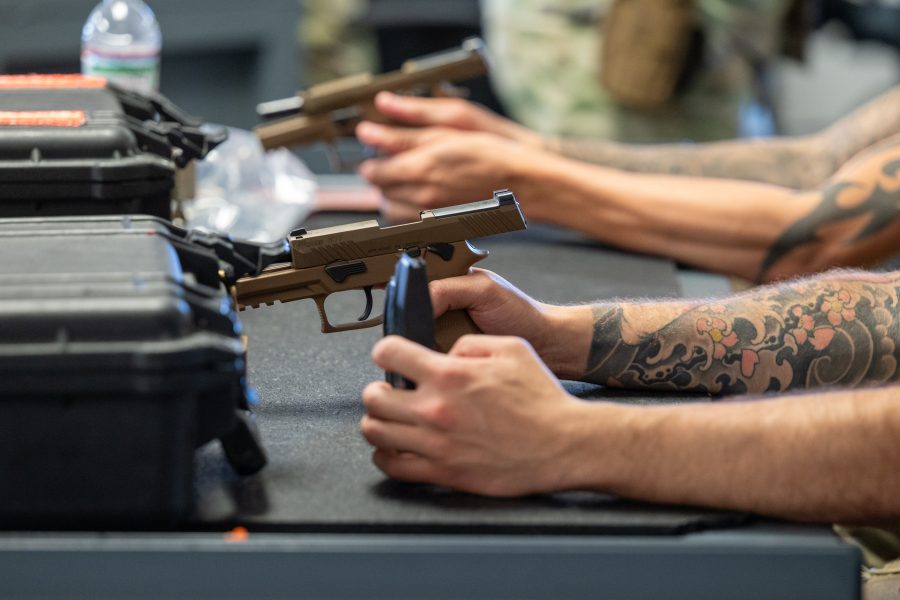Air Force Global Strike Command has cleared Airmen to carry the M18 pistol again after completing inspections of thousands of handguns following the July 20 death of Airman Brayden Lovan, a 21-year-old security forces specialist who was killed on duty when an M18 pistol discharged, the command said Aug. 24.
The investigation into Lovan’s death at F.E. Warren Air Force Base, Wyo., led to the arrest of an unnamed Airmen in early August on charges of making a false official statement, obstruction of justice, and involuntary manslaughter. No additional details have been released about the investigation or the identity of the Airman in custody. The command “has a duty to protect every Airmen’s right to due process,” a spokesperson said.
The Air Force ordered a force-wide inspection of every one of its 125,000 Sig Sauer M18s on July 22, following Lovan’s death. Concern at the time centered on the possibility that the gun had discharged on its own, prompting worries about its safety. Inspections are ongoing; Inspections are ongoing and must be complete within 60 days of the July 22 announcement, an Air Force spokesperson told Air & Space Forces Magazine.
Global Strike Command completed safety inspections on 7,970 M18s and identified 191 with excessive wear on some parts. As a result, it will add improved inspection procedures for the pistol.
“It is paramount that our Airmen trust their weapon systems,” Gen. Thomas A. Bussiere, AFGSC commander, said in an Aug. 24 statement. “This thorough inspection ensures the M18s in our inventory are in optimal working order, providing our defenders with safe, reliable, and effective systems to accomplish their mission.”
Global Strike Command analyzed data “regarding any reported discrepancies and usage rates,” according to the statement. The 191 M18s with discrepancies from standards were pulled from service for repairs. Most of the discrepancies related to wear on the safety lever, striker, and sear. In a striker-fired pistol like the M18, the sear is designed to hold the striker under spring tension. Once the trigger is pulled, the sear releases the striker to fire the pistol.
Global Strike Command ordered additional inspection procedures in the future to catch issues such as those identified in the command-wide inspection, according to the statement.
“By incorporating these added measures, we assess that any issues found with the safety lever, striker assembly, and sear will be identified during semi-annual and annual inspections,” said Lt. Col. George Hern, AFGSC chief of security forces, in the statement “As we execute M18 inspections in the future, we will be taking a particular interest in these components to ensure these methods address the issues we found and make adjustments as needed.”
The Air Force awarded Sig Sauer a $22 million contract in 2020 to replace its Beretta M9 9mm pistol, which had been the standard since 1985. The Navy and Marine Corps also adopted the M18, after the Army selected Sig Sauer to make the full-size M17 and compact M18 variants of its Modular Handgun System, or MHS, in 2017.
The M18 and M17 are both based on the Sig Sauer P320, a commercial weapon that has come under scrutiny for safety issues and is the subject of multiple lawsuits, most filed by law enforcement officers. Users have alleged that the P320 can discharge unintentionally.
The principal difference between the M18 and the P320 is that the M18 features an external safety lever.
Sig Sauer cheered the Global Strike Command announcement.
“We applaud the USAF and the Global Strike Command in both their diligence and expediency in their investigation of this tragic incident, and we greatly value this further confirmation of the safety, reliability, and durability of the P320-based M18 pistol,” the company said in a statement.
The statement said Sig Sauer is “hopeful that this thorough inspection and confirmation by the USAF will satisfy the concerns of the ranges, training facilities, and organizations who have temporarily suspended the use of the P320 and its variants.”
Global Strike Command said its review of weapon discharge data found that no M18 discharges “were attributed to weapons malfunctions.” The command also said the M18 has been “rigorously tested to meet stringent environmental, endurance and drop tests unique to the military.”
Leaders across the command are now meeting with Airmen to discuss the findings of the inspections, explain the updated inspection procedures and reinforce safe weapons handling practices, according to the Global Strike Command statement.
“When we see a potential issue, we have a responsibility to our Airmen and the American public to evaluate, find any discrepancies, and act on them,” Bussiere said.


